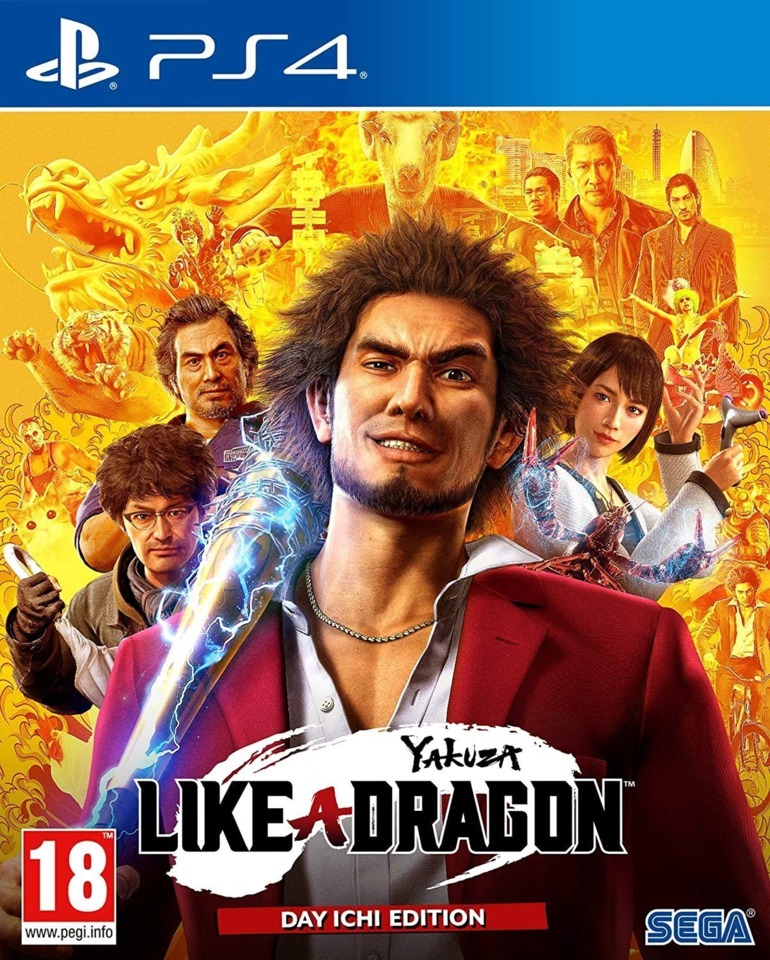
Greetings fellow collected underworld figures of the Mentojo Clan to another piece on Yakuza's many extra-curricular activities. As someone who plays far too much of every Yakuza entry that passes my desk, I find myself wanting to wax lyrical about all the side content in the game: mini-games, substories, bonus objectives, and other features that - due to their non-prominence in the game's story - could well go underappreciated or ignored entirely by those that play these games but not to the same overly-thorough degree that I do. And why would they? They have busy lives to lead outside of Kamurocho, after all. That's why I'm here to tell y'all what you may have missed out on, albeit a year or two late to the party.
My usual pattern with Yakuza blogs is to focus on what new ideas each entry introduces to the standard assortment of activities, and whether or not those new additions have been welcome. Yakuza: Like a Dragon, despite the whole new turn-based RPG paradigm, does retain a lot from prior Dragon Engine games like Yakuza 6 and Yakuza Kiwami 2 including a few mini-games left almost entirely as-is with perhaps some new variations. I'll get into those after I'm done listing the new stuff, but suffice it to say that underneath the surface of its shiny new gameplay model much of what Yakuza: Like a Dragon offers in terms of side-content is very much of a muchness with what the franchise has delivered so far.
As for the game itself, well, I've been feeling sort of ambivalent about it so far. I like the new protagonist Ichiban Kasuga - he feels like a smart amalgamation of Kazuma Kiryu (impossibly virtuous, charismatic enough to draw compatriots, and reckless enough to push the story forward whenever it stalls) and Yakuza 5's Tatsuo Shinada (a big trusting goof that becomes a pillar of a community of burnouts, hobos, and other dregs) - as well as the six "party member" companions he recruits. I think Yokohama, the game's primary location, is another well-realized vertical slice of a major Japanese metropolis which, like Kamurocho, has its seedier corners and its much nicer tourist-friendly zones. I think the way the game tries to incorporate RPG tropes and mechanics in a semi-realistic context is both funny and clever, like how "job" classes are literally temp jobs that Kasuga and co. take on; it's kinda amusing that they're never seen doing any of these jobs, just dressed as and wielding the tools of same for the sake of combat. It's great that the game's bestiary follows suit: the regular thugs and hoodlums are all given a once-over by Kasuga's imagination to make them more like Dragon Quest monsters.
However, as a turn-based RPG, the game's often a slog and the difficulty curve is all over the place. There's a particular boss fight in Chapter 12 that's many magnitudes harder than anything you're used to: the game specifically opens up its arena mini-game at this time purely to give the players the extra experience and gear they're going to need to deal with this hump. For story reasons, it makes sense why you'd fight those opponents then, and naturally they're going to be some of the hardest foes you've yet encountered (the series has to keep up appearances for its "legendary" characters), but it's remarkable that the game has to go out of its way to prepare you for a massive difficulty hike - it's a little like how modern MMOs will just let you fast-track through the first fifty or so levels so you can get to the "good parts." Conversely, with the cakewalk regular random encounters, I usually find myself hitting the auto-battle function and letting the game play itself for a while. Maybe it's just the lack of a Komaki Tiger Drop talking, but I find this combat far less engaging than when the series was still a brawler; that format had its ups and downs and was starting to feel its age a bit but if nothing else it was way faster to get past these brawls with the absolute no-hopers that would force you into a fracas whenever you ran down a narrow street or alleyway. The job system does offer a number of different tactical options and party dynamics but since it's so tough to adopt a new profession and be so statistically behind - as characters have both regular character levels and job levels that enhance their stats upon levelling up - it's often better to just stick with whatever combination is currently working when facing the next story boss or dungeon. I think this is something they can and should figure out with the sequels, since it sounds like they intend to stick with Kasuga and this format in the near future (with their Judgment sister series acting as "Coca-Cola Classic" for those of us who miss the brawling), and I've every faith they'll figure it out. If they went full grid-based strategy RPG next time I wouldn't be surprised or opposed either, though I suppose that would make random encounters drag on even longer.
Talking of dragging on (and dragons), let's finally get into how else Yakuza: Like a Dragon is not like some other Yakuzas:
Business Management
An evolution of the real estate empire a younger Kazuma Kiryu runs in Yakuza 0 as his major side-activity in that game, the goal of Like a Dragon's business management mini-game is to become the top company by share price in Yokohama, starting as a modest senbei store (senbei are rice crackers, as far as I can tell) and eventually acquiring other businesses and staffing them with competent personnel able to wring the most sales out of them. Like the street gang sim from Yakuza 6, this is a mini-game that gets easier after you go out into the world and complete substories and talk to many people: most of the best hires you can get for your company are unlocked through means outside of the mini-game itself. It's then a matter of assigning the right people to the right roles based on three criteria - their ability to push product, their customer service, and their notability as a means to draw in interest - and using the money you earn to either promote people, train them, motivate them with perks, buy new businesses, or upgrade the businesses you have. After every four earning quarters, you have a shareholder meaning where you have to convince a panel you're doing a good job: these work closer to a regular RPG fight, as you send out employees to counter and "fight" each shareholder until they're satisfied. A good performance with the shareholders is what boosts the share price the most, which in turn unlocks new opportunities as you rise through the ranks.
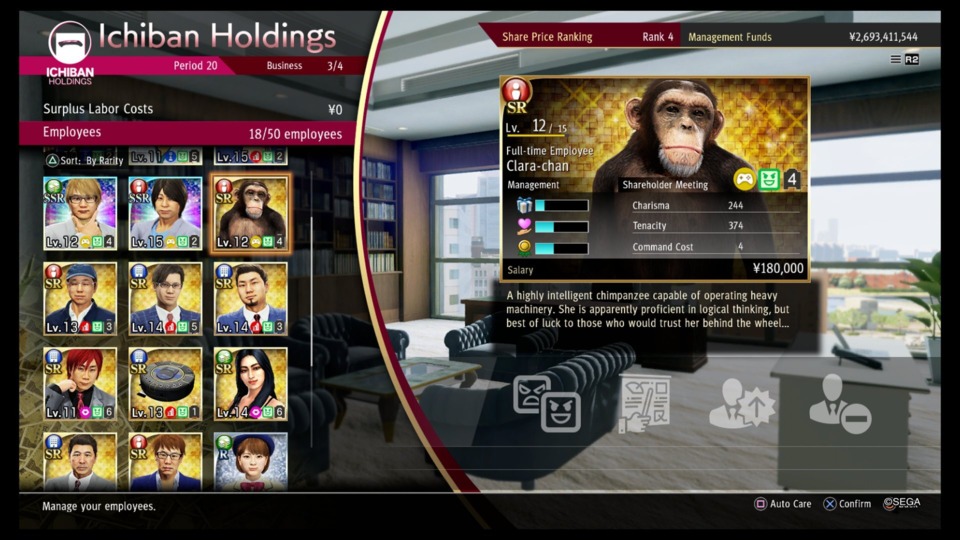
It's one of those mini-games that seems overwhelming when you first take it all in, but proves to be deceptively simple once you have the hang of its loop. I realized right away that borrowing money would be a terrible idea - all have interest rates to deal with, so it never works out in the long run - and that I'd get the best returns spending almost all the money I had on upgrades and decently-trained employees. Every time I ranked up and had access to new businesses, I'd spend almost every yen I had on buying those businesses up, hiring good people to run them, and getting both the business and the employees upgraded as high as possible. And then just the first few money-earning cycles alone would bring in the same amount I'd just spent, easily validating the expense. You don't actually get to keep the money that your business earns - major bummer when you start talking billions later on - but the CEO bonuses you get after every shareholder meeting are no joke: I'm now getting millions of yen after every meeting, which is enough for most of the game's bigger expenses like upgrading the local gear-crafting center or shopping at the city's priciest illegal arms merchant (another familiar if inexplicable cameo). Unlike most of the other mini-games that operate as distractions and an occasional means to earn rare items or the in-game achievements (and sometimes actual achievements), the vast amount of money you earn from pushing your business to the top of the food chain is instrumental to the core game.
Can Quest
The first mini-game you unlock shows up after Kasuga wakes up in a trash heap with a hastily stitched bullet wound and makes good with the local homeless population, whom tend to be the unsung heroes of the franchise thanks to small but notable roles throughout each game. Here, the goal is to collect as many cans in what I can only describe as a competitive eco-friendly Pac-Man: driving through cans adds them to your total, while hitting obstacles and getting run over by other competitors or the garbage truck means losing them. You only earn peanuts from recycling these cans - for one, it's important the economy of this chapter of the game stays on the right side of the decimal point - but you can trade for some very valuable items with enough cans in the bank.
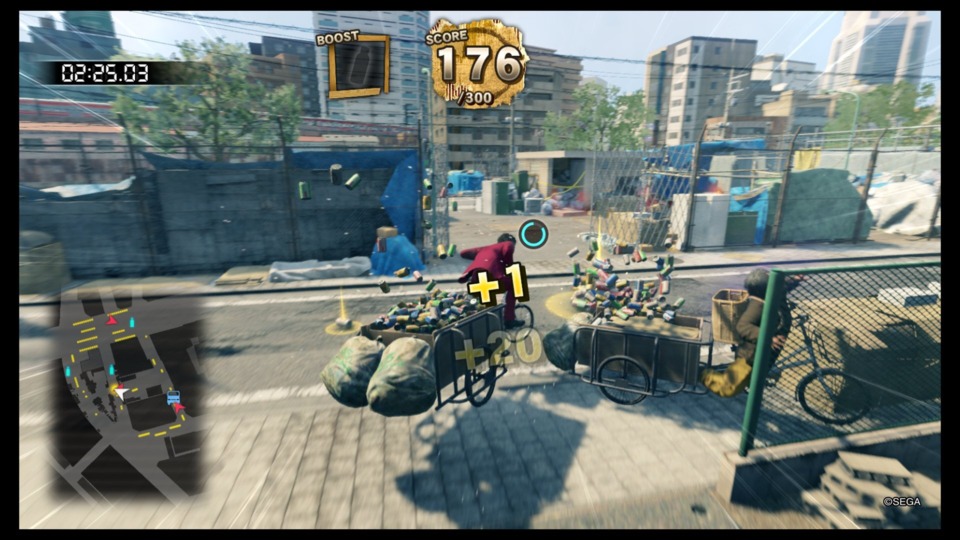
I found this mini-game pretty fun, though it ideally works best in spurts and only on the highest difficulty where there's some degree of challenge and enough of a reward to be worth the investment. Like a Dragon does a smart game design thing here by having the prizes be apparently worthless stuff you'll occasionally need at intervals, like a substory or fetch quest that only opens up four chapters later, so you're constantly being given reasons to stop by and cycle around collecting trash aluminum and avoiding your rivals. If nothing else interests you, you can always grab some Persona 5 music to listen to at your group's hang-out bar.
Dragon Kart
Yakuza's no stranger to driving games: Yakuza 5 had an elaborate Initial D street-racing parody and at least two Yakuza games had you competing in remote control car circuit racing (it's called Scalextric in the UK, but I've no idea how far afield that brand recognition goes). Dragon Kart combines the two, creating a Mario Kart riff (or, perhaps more accurately, a Sonic & Sega All-Stars Racing riff) where between races you can buy and modify new karts for the horsepower and handling you need to beat the tougher tracks and rival racers. It's pretty much a kart racer down to its bones, including power-ups that you can preserve until they're needed and an emphasis on drifting around corners and hitting the course zippers whenever you see them.

I've been saving it for the end- or post-game since it requires cash to get anywhere, but once I'm kitted out with the best gear money can buy I'll be finding other ways to spend that lucre. What little I've seen has been enjoyable for a mini-game; kart racers have always been a crapshoot for me beyond Diddy Kong Racing and the original Super Mario Kart (i.e. the only good kart racers) because of how those games are encouraged to rubberband you to hell and back, but its uncommon focus on improving performance through developing parts and picking the right kart for the job makes Dragon Kart a slightly more interesting single-player experience. Like I said, for an optional mini-game it's probably far better than it needs to be.
Seagull Cinema
Close to the restaurant district is an old cinema that plays "classics" (that is, overdramatic parodies of popular movies) that Kasuga can watch alone or with a friend. The basic conceit is that Kasuga has so much ADHD that sitting through a two-hour movie without dozing off is near-impossible, so the mini-game has you batting away REM-inducing nightmare sheep-humans in a whack-a-mole fashion in order to stay awake throughout the whole movie. It's like something out of Catherine.
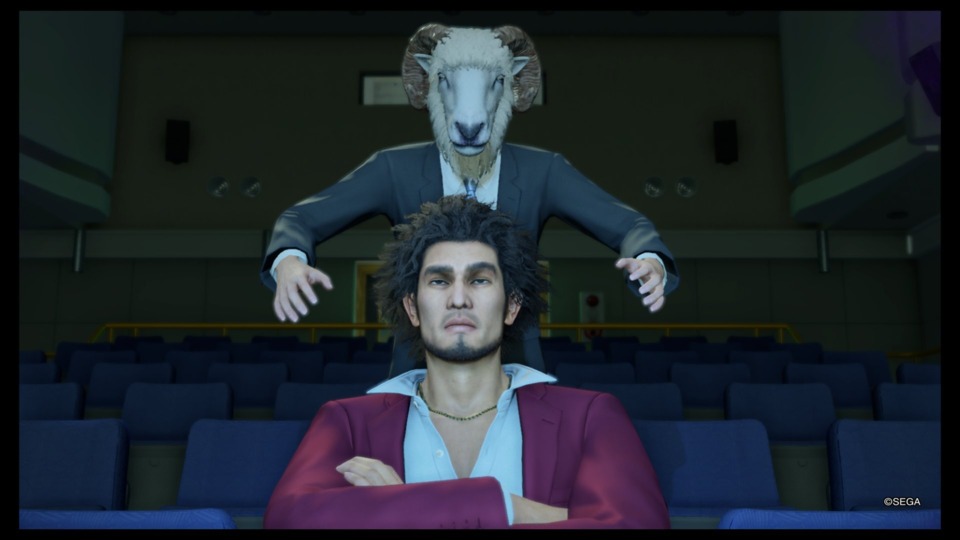
There's not a whole lot to the mini-game besides having fast reactions (and not hitting the chicken-humans, since they're here to help) but the goofy line reads coming from the terrible movies is enough motivation to watch all ten. I'm curious how they sound in the dubbed version, since VAs often have a ball when told to act badly on purpose. Plus, it's also a good way to build up your bond levels with your companions. The constant bleating can get old fast though...
Vocational School
Kasuga going to vocational school feels part and parcel with the early portions of the game's story, after Ichiban's served almost two decades in jail, is unceremoniously ignored by his former yakuza patriarch, and winds up in Yokohama near-dead with little direction in life. He's determined to get off the streets and that leads to part-time work and helping out an elderly madam for the spare room in her makeshift brothel. That dirt-poor optimism early on as a bunch of middle-aged men slowly get back on their feet is one of the strengths of the game's relatable ensemble of losers; not exactly a rags to riches story, but at least rags to a presentable suit without bulletholes.
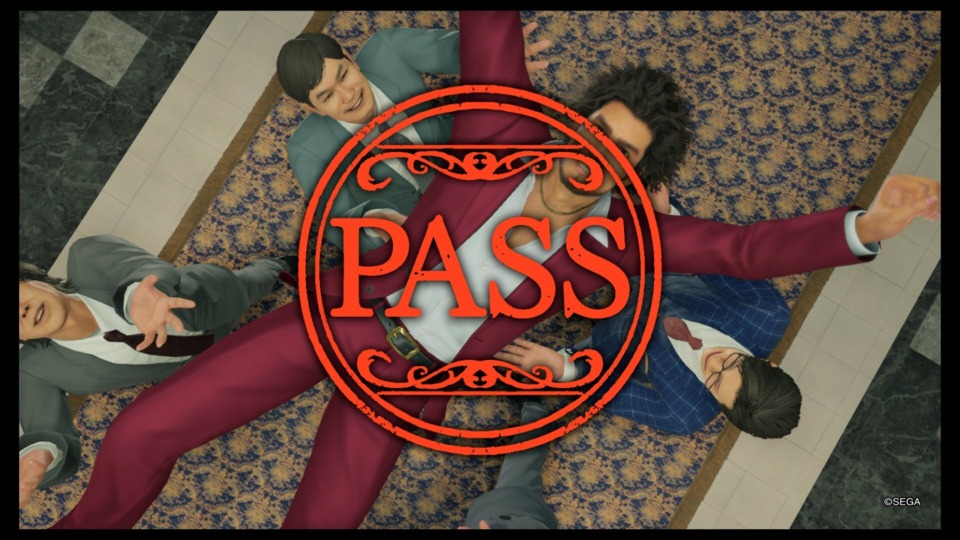
The vocational school itself is simply a place where you can take trivia tests: there's twenty quizzes you can take on a variety of subjects and you're required to get at least three of the five multiple-choice prompts correct to pass. Passing the test nets you some pretty major personality stat boosts (they're similar to the personality stats in games like Persona, or really any dating sim) though the tests are expensive to sit and you don't get anything for failing. I did my very best to not look anything up on the internet like a cheater, but there's some real esoteric business in there and the more Japan-focused questions didn't help. I sometimes wonder how translators agonize about localizing those and the similar questions you were asked in Persona games; either you keep them as-is and alienate those who don't know anything that specific about Japanese history and culture, or you change them and alienate those that are absolutely that deep into their weeb studies and are playing the semi-realistic Nihon-'em-up sims that are the Yakuza games for that same reason. Sorta like how fans reacted when Sega of America took all the mahjong and koi-koi and hostesses out. What a dark, unsexy time that was.
Part-Time Hero
Part-Time Hero was when the other shoe dropped for me, because Yakuza games have always packed to the gills with bonus objectives to pursue: eating at all the restaurants, mastering all the mini-games, or grappling with the glitchy claw machines long enough that you finally collect all the Super Monkey Ball monkeys again. Yakuza: Like a Dragon didn't have anything like that when you first start out, but a few chapters in they're introduced as part of this Part-Time Hero smartphone app that allows people to call in a fighter to help them take down aggressors and conmen harrassing them in the street; it's sort of like an "Uber Beats." You're quickly dragooned into joining this service and can use it to earn rewards for certain special encounters, completing fetch quests, or taking down groups of specific enemy types. The other side to it are the challenges, which is where all the usual game-wide objectives can be found.
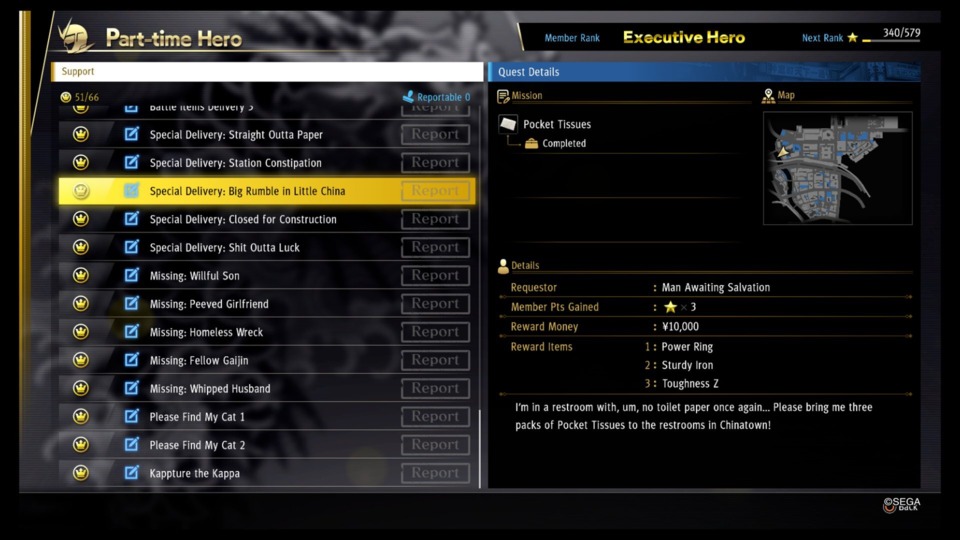
Yakuza 7 is like Yakuza 6 in that they've become a little more lenient on behalf of achievement hunters - rather than 100% of these challenges, you only need to complete just over half for the related trophy - but you certainly have plenty to be getting on with in that list if you've completed everything else and are jonesing for more Yakuza content. That said, you could probably just wait a year or two and another one will have come out.
The Rest
Far as I can tell, most of these mini-games (with a few exceptions) have been left as-is since their last inclusion in Yakuza 6 or Kiwami 2. They're enjoyable time-wasters with their own reward systems - mostly CDs and character development items like the magazines, though they have the occasional high-quality gear sold at a premium - but largely unchanged. Obviously, you're still going to play them to completion if you have the same brain worms I do, but it's a little disheartening to see how many mini-games crossed over as-is given how different everything else is. Still, it's better to have them than to not.
Batting Center: The Batting Center offers the same courses it usually does, with the player returning pitches with precision timing to score home-runs. Each course has ten pitches which, despite having some tricky trajectories, are the same every time: even if you get caught unaware by a few of the curveballs and sinkers, you can memorize the pattern and get a perfect result on subsequent attempts. Just a matter of patience, really. CDs available: PSO 2, NiGHTs, and Rent A Hero (not the in-game Part-Time Hero service, but the unlocalized Mega Drive game; gotta imagine one inspired the other though).
Golf: Golf returns from Yakuza Kiwami 2 (I don't recall if it's in the original; I want to say the first time I played a Yakuza golf game was in Yakuza 3) and has a similar premise as the baseball challenges, in that you have a couple of mini-game premises that would work in a driving range format. The first has you driving the ball as close to the pin as possible - it's kinda like Super Monkey Ball, but without the monkeys - and the second seen in the screenshot included requires you to hit as many of these nine panels as you can in ten shots, with later shots complicated by heavier wind and the panels suddenly moving around. I'm kinda glad I don't have to worry about my short game, since it's awful, but then I also think Yakuza could do something really fun with mini-golf. I mean, besides beating up punks with a putter by the side of a windmill.
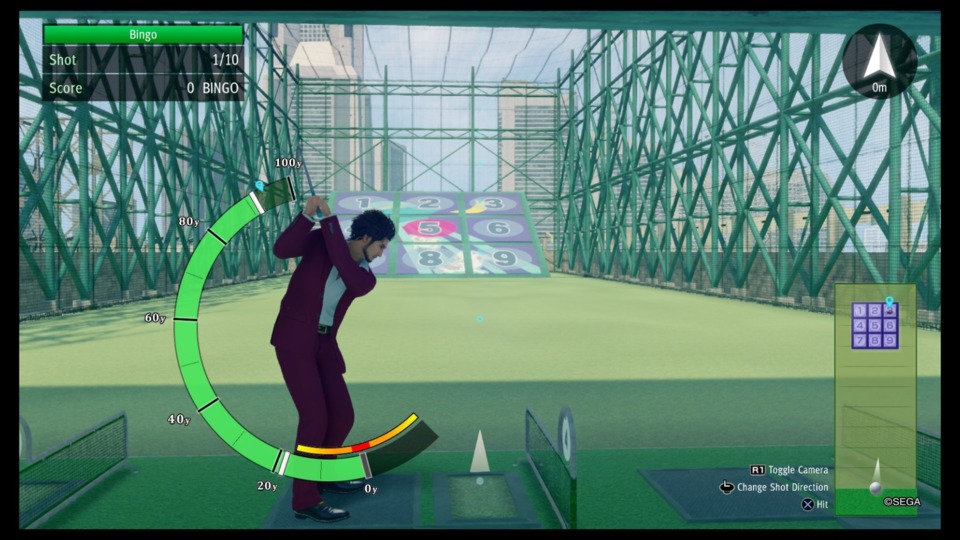
Darts: Same darts as before, with its three variations - the one where you aim for a specific total, the one where you take dominion of parts of the board before you can earn points in them, and the one where you just try to score the highest. I found it pretty easy with just the standard darts you can buy from the nearby attendant, but you can making the timing mini-game easier still with the higher value darts. I always find it weird that you carry darts with you wherever you go in these later Yakuza games but are never allowed to throw them at enemies. Is the game of darts that sacrosanct?
Karaoke: Having multiple companions in this one means everyone gets their own separate special karaoke performances, not just Kiryu and/or Majima. It's still as tough as ever on its highest difficulty: like the more recent games, you can choose a softer "casual back-up" over the harder "passionate back-up" (this only applies to songs your companions sing; there's only one difficulty for Ichiban's singing). Karaoke has the same issue as ever: you're constantly distracted by all the crazy pyrotechnic effects and costuming going on in the performances but you need to focus on the timeline of buttons to hit if you want to actually do well. I've been checking them on YouTube instead.
Mahjong / Shogi: These are still the same too, but then they are board games that have existed for a thousand years. One feature introduced in... I want to say around Yakuza 6 but maybe earlier is that they actually give you the numbers for the character tiles: previously, you just had to memorize the kanji. There's a bunch of info on winning hands and the like too, but if you've followed Giant Bomb's "This is the Ron" feature you should already know them all by heart. Remember the best tactic: always go for Thirteen Orphans. Never fails. (Shogi, meanwhile, remains as enigmatic as ever. I looked up all the puzzle shogi solutions for some quick reward points, which I needed to buy the soundtracks for Valkyria Chronicles and Feel the Magic: XY/XX. No amount of complex Asian chess can get between me and my Sakimoto OSTs.)
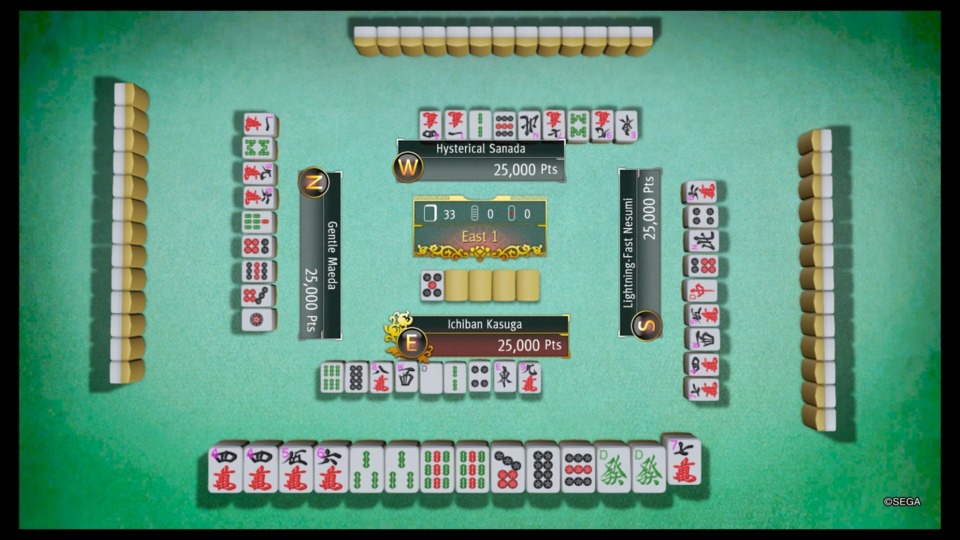
Arcades: This was the most disappointing. Sega has a huge library of arcade games, including some that have never seen a home version of any kind, and yet the offering here is identical to that in Yakuza 6: OutRun, Fantasy Zone, Space Harrier, and two of the Virtua Fighters. They don't even have a weird bespoke one like Boxcelios. None of the arcade games besides Virtua Fighter offer completion bonuses either, side-lining them even further. They could've at least brought back Taiko Drum Master from Yakuza 5 and filled it with Majima boss fight themes or something. Laaaaame. (Then again, after seeing what they're doing to Sonic Origins, maybe Sega is following Nintendo's example too closely these days.)
Gambling: The gambling mini-games have been pared down to just the four: poker, blackjack, koi-koi, and oicho-kabu. I believe the last of those is what leant the yakuza their name, so it's kind of a mandatory inclusion. The poker is, of course, in the Texas hold 'em style and has been pleasantly easy: the AI isn't the most sophisticated, though I came close to getting carried away in raising the stakes a few times. Good source of cash at least if you really don't like the business management game. Also, something about how the game helps you out with the hanafuda games makes them easier to deal with somehow. There's an easy enough pattern to follow - the more elaborate-looking cards score higher, generally - but it's not always clear which moves are the legal ones. I've heard the hanafuda in that Clubhouse Games on Switch is a similarly good gateway too. (There's also the pachi-slots, but that required a separate 10GB DLC pack. I ain't freeing up that kind of space for dang ol' pachi-slots.)
Anyway, that's an exhaustive enough rundown of the new and old mini-games in Yakuza: Like a Dragon and my impressions of same. I've been considering ranking all the mini-games from across the whole franchise, though my memories of some of the older ones might be getting too hazy and I've not played the updated Yakuza Kiwamis yet (nor will I, probably, unless the Yakuza franchise ends tomorrow and I start to get desperate). It's almost always worth spending a little time with them all, whether they have rewards you can use or not, and since I've yet to reach this game's Amon fight yet to update this blog I think this should be enough of my impressions of this game. I'll see you all again 'round Kamurocho way when I finally give Lost Judgment a spin.
| Part of a series on Sega's Yakuza | ||
|---|---|---|
| Yakuza 2 | Yakuza 4 | Judgment |
| Yakuza 2 (Mahjong) | Yakuza 4 | |
| Yakuza 3 | Yakuza 0 |
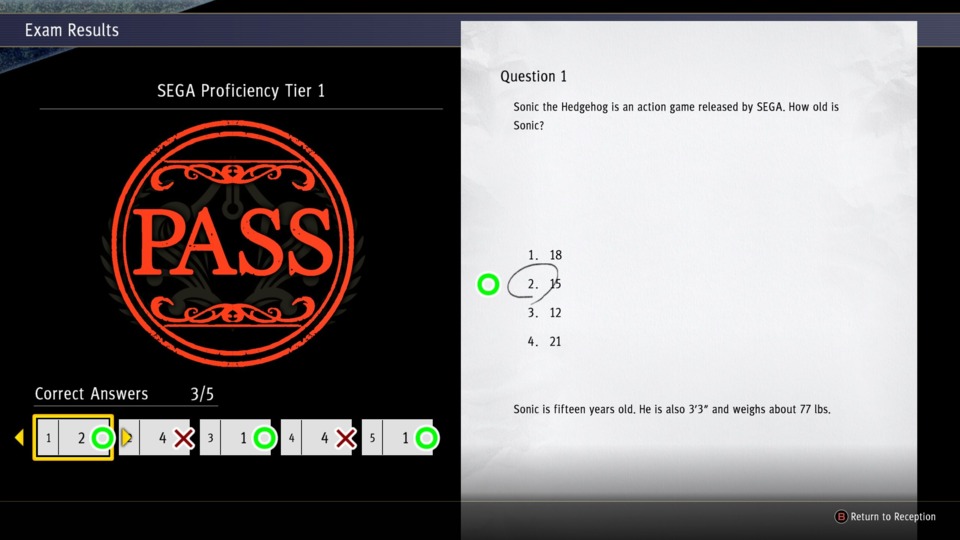
Log in to comment